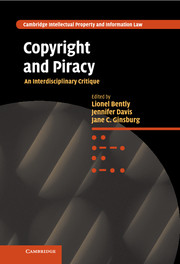Book contents
- Frontmatter
- Contents
- Notes on the contributors
- Editors' preface
- Table of cases
- Table of statutes
- Part I Introduction
- Part II History
- Part III Comparative Law
- Part IV Economics
- Part V Linguistics
- Part VI Computer software
- Part VII Information studies
- Part VIII Literature
- Part IX Art
- Part X Sociology/music
- Part XI Criminology
- 20 Copyright infringement: a criminological perspective
- 21 Towards a clearer understanding of the file-sharing phenomenon? Comments on a criminological perspective
- Bibliography
- Index
21 - Towards a clearer understanding of the file-sharing phenomenon? Comments on a criminological perspective
from Part XI - Criminology
Published online by Cambridge University Press: 17 November 2010
- Frontmatter
- Contents
- Notes on the contributors
- Editors' preface
- Table of cases
- Table of statutes
- Part I Introduction
- Part II History
- Part III Comparative Law
- Part IV Economics
- Part V Linguistics
- Part VI Computer software
- Part VII Information studies
- Part VIII Literature
- Part IX Art
- Part X Sociology/music
- Part XI Criminology
- 20 Copyright infringement: a criminological perspective
- 21 Towards a clearer understanding of the file-sharing phenomenon? Comments on a criminological perspective
- Bibliography
- Index
Summary
Loraine Gelsthorpe in her contribution to this volume (Chapter 20) explores copyright infringement on the Internet as ‘a new crime of the twenty-first century’. She notes the pervasiveness of the phenomenon, and seeks to apply theories of criminology to explain what motivates it. She concludes that conventional criminological theories cannot provide a satisfactory explanation for the phenomenon, which she characterises as a ‘grey area crime’, one marked by moral ambiguity. Instead, she turns to the insights to be drawn from analyses of the impact of late modernity, or the social transformations that have taken place since the 1950s.
In her view, the normative compliance that ideally provides reasons to obey the law (based on the acceptance of social norms, social bonds or the legitimacy of authority), has been weakened in the UK and elsewhere in the last fifty years. She sees an increased moral individualism and relativism, and the ‘democratization of social and cultural life’, or a decline of deference. As a result, authority figures today must work harder to achieve legitimacy. In addition, the emergence of a ‘risk society’ in late modernity has led to an environment where tradition is replaced by a pluralism of expertise, and the emergence of a rights-based culture where the dominant values are choice and individual rights. She describes as a key component of contemporary morality a strong focus on ‘the victim’ – and the problem is that there may be little sympathy for the victim here, perceived as rich multinational corporations.
- Type
- Chapter
- Information
- Copyright and PiracyAn Interdisciplinary Critique, pp. 410 - 420Publisher: Cambridge University PressPrint publication year: 2010
- 2
- Cited by



